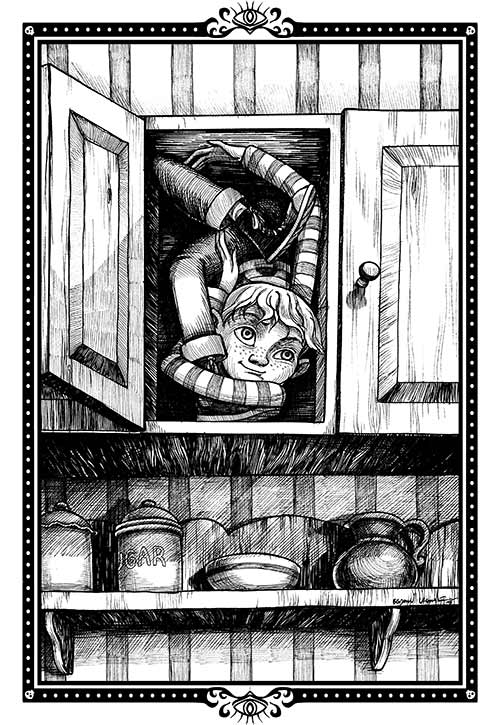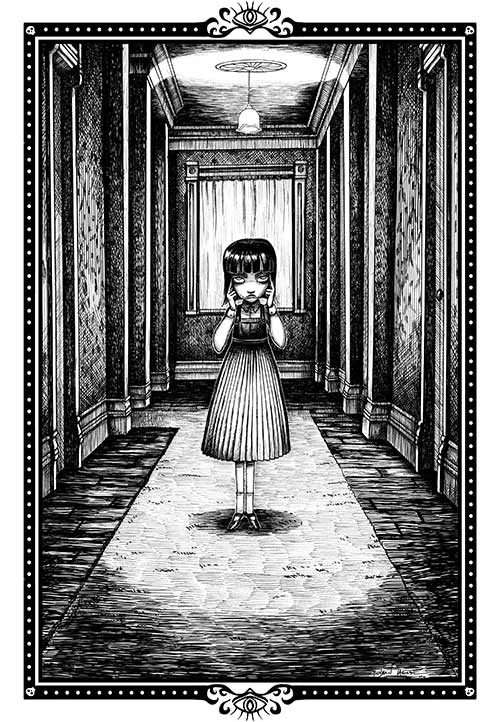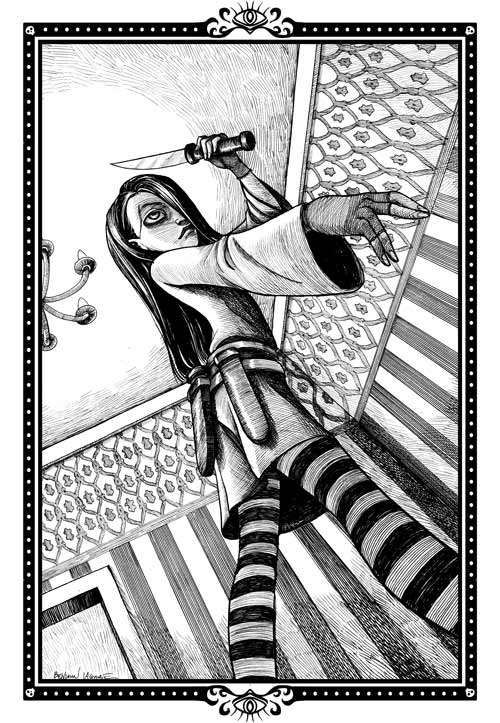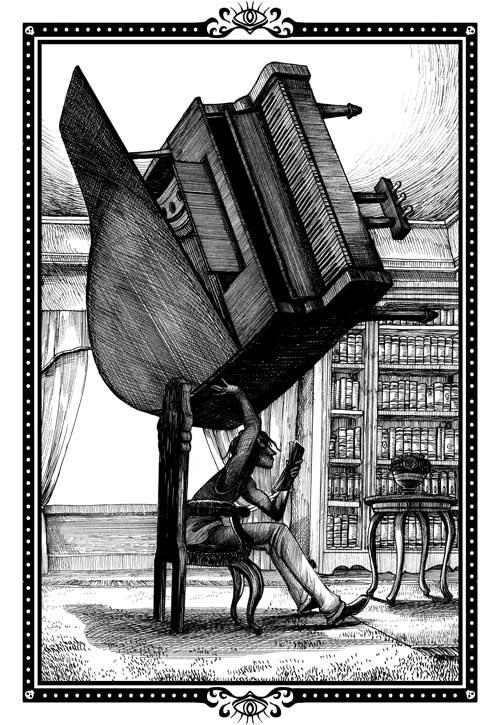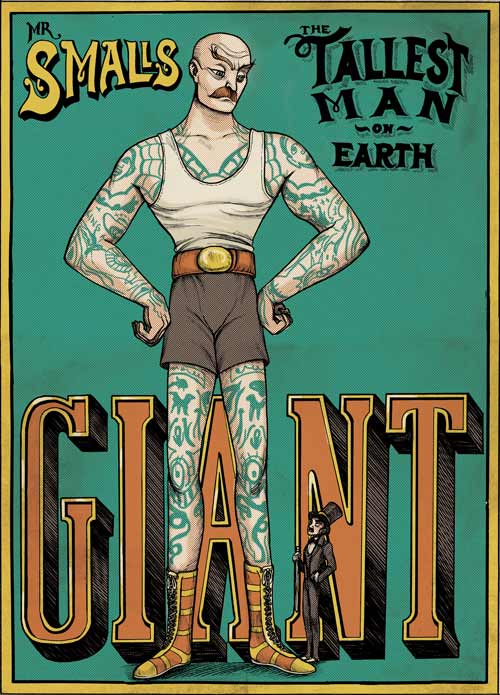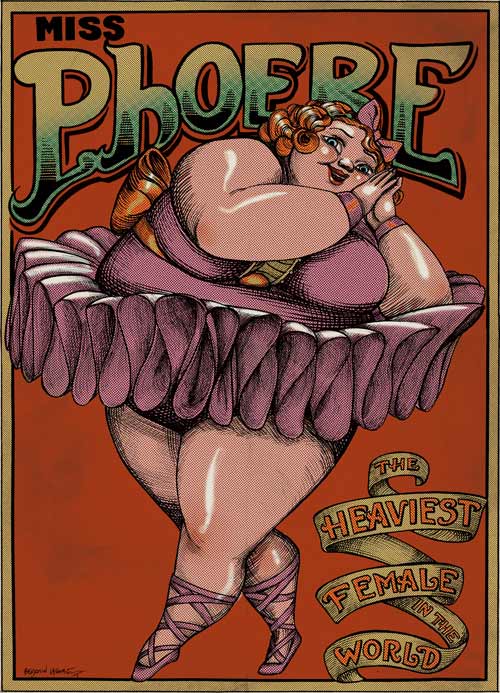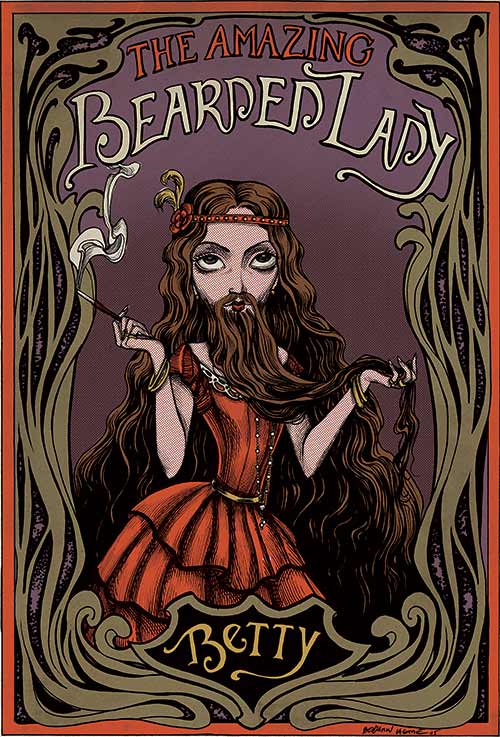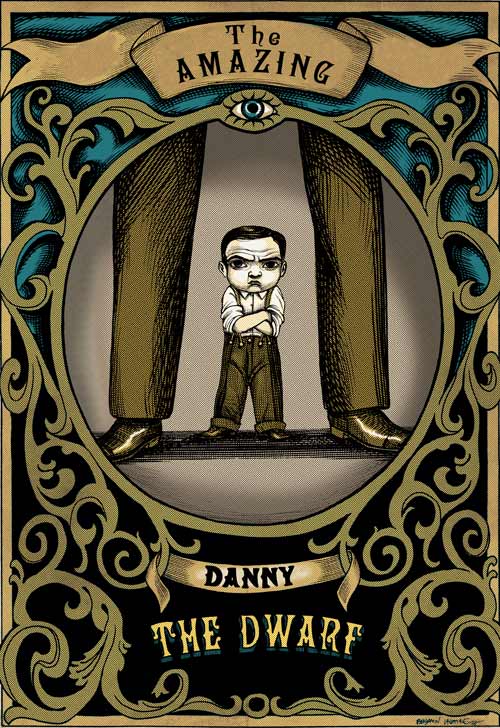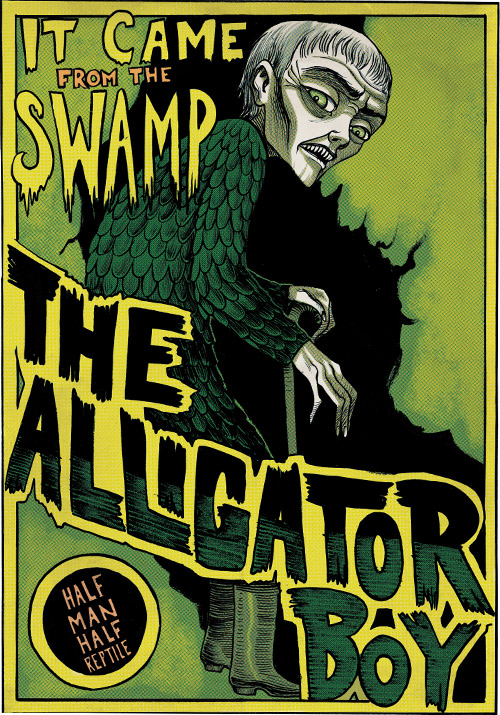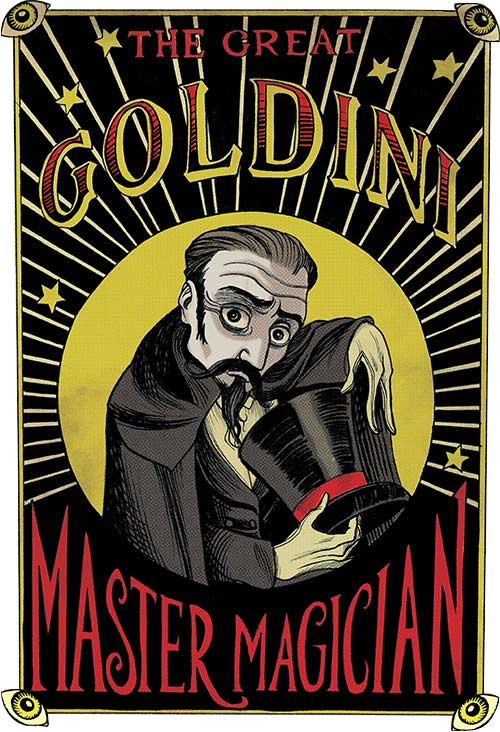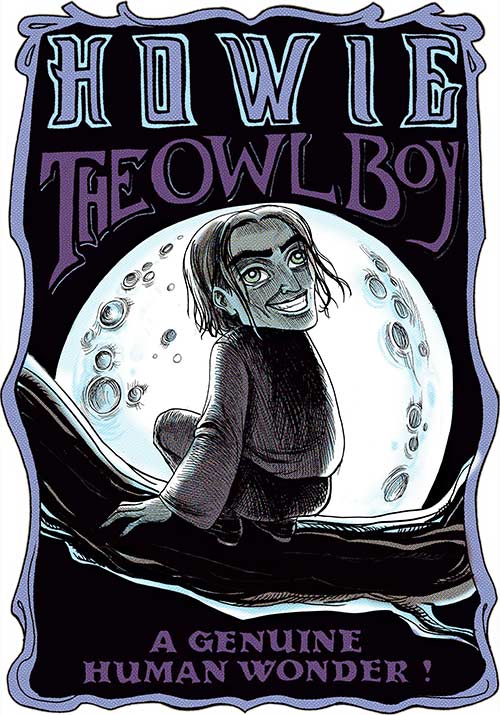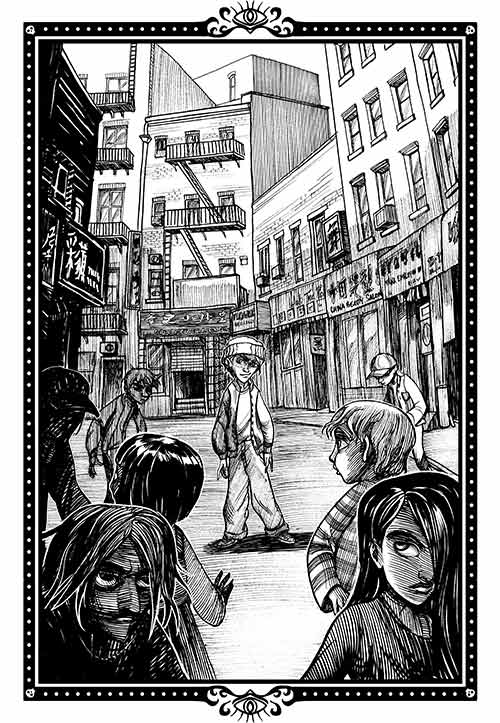
Treasures from the museum collection
Click on the images to read the stories behind the objects. The text is taken from decorative plaques hanging beneath the exhibitions.
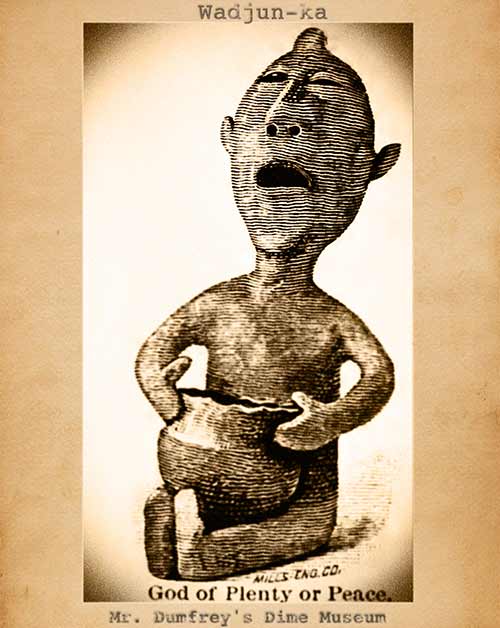
Wadjun-ka
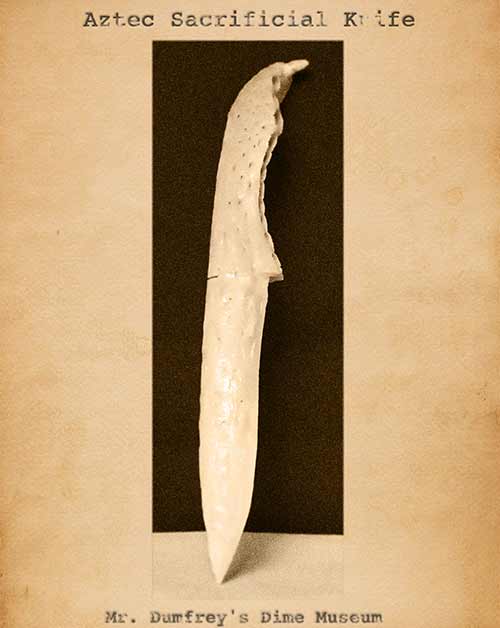
Aztec Sacrificial Knife
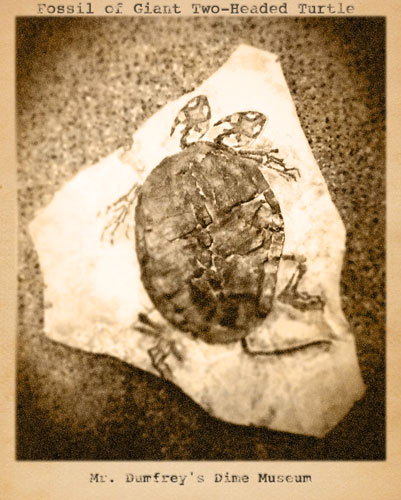
Two-Headed Turtle
A strange legend attaches itself to the figurine of Wadjun-Ka, the God of Plenty or Peace, which goes as follows: years ago it came into the possession of a narrow-minded, greedy bank teller in New York City by the name of Amos Bostwick. Now Bostwick himself felt the thing was ugly and likely worthless when he first came across it in the back of a dusty antique shop. But his wife, a mild and sweet-tempered woman named Philene, was enamored of it. She had for years been trying to have a baby, you see, and she felt that with the god of plenty on her side, she would surely not fail to produce one.
So they took the statue and Bostwick hid it in a corner of his study, and, lo and behold, only a few months later Philene became pregnant. She was ecstatic. Her husband was less so, especially when the baby came--a beautiful, dark-haired girl they named Lydia, with the same sweet temper as her mother--and the bills began to pile up. Dresses and dance lessons, pinafores and sweets, dolls and riding boots, ballet slippers and a miniature piano. Every time he signed a check he felt his heart shrivel with rage, and though they were perfectly comfortable he began to think of nothing but money, money, and more money.
He began to hide money wherever he could, then claim to his wife he had none--when, for example, she came to ask him for a pair of shoes for their daughter to replace those that had worn out. One day, as he was sitting at his study desk with his back to the door, counting a stack of silver dollars, he heard someone enter. Quickly, before the person could see what he was doing, he shoved the coins into the open mouth of the little statue. When Lydia--for that’s who it was--asked if she might have a nickel for an ice cream cone, he regretfully informed her that he had no money and suggested that she go drink a nice, ice-cold glass of water instead. Imagine his surprise when, after she had gone, he turned back to the statue and discovered that the little bowl clasped between its hands was now overflowing with twice the number of silver coins as he had stuck down its throat--as if the statue had spat up the silver dollars and in the process caused them to multiply.
Intrigued, he repeated the trick again, and again the quantity of coins was doubled. Now breathless with excitement, he unscrewed his watch and fed it into the statue's mouth. A second later, two identical watches lay together in the bowl.
You know, I'm sure, what happened next. As soon as the bank opened the next morning, he practically flew there and withdrew all of his money in the form of gold coins. These he fed one by one into the mouth of Wadjun-Ka, receiving two coins back for every one he inserted, and then reinserting each of these two coins to receive four more, and so on and so on, and at the end of that night he was the richest man in the whole city.
He, his wife, and daughter moved into a mansion as big as five of their old houses combined. His daughter now had a stable full of horses, a room full of shoes, a gallery of pianos, and her own private ballet studio. Still, he couldn't stop. He no longer left his study. He skipped meals and obligations and quit his work. He spent hour after hour feeding coins into Wadjun-Ka's mouth, feeling a thrill anew every time the doubling occurred, building towers upon towers upon stacks and stacks of gold, so much gold all around him that slowly, very slowly, he was hemmed in entirely. And suddenly, as though awakening from a daze, he realized he was all alone, and couldn't see the door; and that he was scared, and didn't know what time it was or what year it was or whether or not he was old or young; and when he cried out for help the sound was absorbed by those shimmering walls of money money; and when he tried to stand the whole prison of gold came down on his head, and buried him.
CLOSE
The following accounts are from the diary entry of the Mad Comte Palomer, a nobleman in the court of Louis XIV, known as the Sun King. The Comte was a well-liked figure amongst gentry, known for his extravagant costumes at masquerades. As his reputation grew, so did his influence with the King and high-ranking courtiers, but so too did the pressure to make each outfit more fabulous and intricate than the last. As a result he began to cultivate a great collection of clothing, weapons, and accessories from around the world, thrilling his friends with Belgian lace, Russian furs, beads from China, and stone knives from the Americas. The new level of realism in his wonderful costumes added greatly to his acclaim, and secured his position as the greatest party guest in the Royal Court of France, but it also sent him into great debt.
The Viscountess M____ is holding a masquerade to celebrate the coming solstice, and I have been assured that I will be the only one there dressed as the great god Apollo. I must admit to my excitement for this little party. I think my costume will the most splendid yet. But, alas for my coffers, to dress as a sun god will require nothing less than GOLD! Yes, soft, sunny, beautiful GOLD from the top of my wig to the tip of my new heeled silk slippers! I will not be satisfied until I am as radiant as a sunny day.
The stress of his financial troubles, along with the many toxic substances he used to paint his face and color his hair, eventually drove him mad. Since he only ever saw King Louis XIV in the evening, he became convinced that the man known as “the Sun King” was literally the sun in the sky, only coming down to rule France after night had fallen. It was not appropriate, he felt strongly, for such a pagan creature to rule over the French Republic. He concluded that it was his patriotic duty to rid his country of this monster-king forever.
The thing will need to be done. I am frightened to think it, no less write it in my journal, but if I do not express some measure of the fear that I feel I’m afraid I will go mad with the secret. There is a monster in Versailles, and I’m afraid that no one can see it but I. I have never been a brave man, but I hope to God I am a good one. The thing must be done.
It would be cowardly, he decided, to kill the king in his human form. A powerful creature such as this must fall on the field of battle, in a contest of equals. In the end he decided that a small Aztec sacrificial knife would do the trick.
For years afterward, the Comte wasted all his energy trying to kill the sun. He spent his days dashing across lawns and climbing trees, waving his little knife around in the air. He spent his nights glaring at the King from across the room at parties, and quickly found that his invitations dried up.
The upside of which was that his spending slowed significantly. His son was able to pay off his remaining debts, and sold off his wonderful collection to buy him a heavily shaded cottage in the deep woods. The only piece he could not convince the Comte to part with was the little stone knife. For the rest of his life he would take it with him on walks, in case the light broke through the trees on a particularly sunny day.
The most fascinating aspect of the fossilized two-headed turtle, a highlight of our Weird Natural History Through the Ages exhibit, is that it might not have come to us at all were it not for the longstanding rivalry between a Miss Amelia Firestone and her brother, Jeremiah, who lived in Boston at the turn of the last century.
Jeremiah was, by all accounts, a brutish, blunt-headed, stupid boy, with hands like two shovels and a nose that resembled a squash blossom. But his parents doted on him, as parents tend to do, blinded to all of his many faults; while poor Amelia, who was smart and brave but also slightly small for her age and, well, a girl, went almost completely unnoticed. She was constantly showing up to dinner and finding that three and not four places had been set, and the only person who ever remembered her birthday was the cook.
Jeremiah, however, got heaps of gifts at Christmas and on his birthday and sometimes for no reason at all. His father, Jeremy, had made a fortune manufacturing bitter licorice sucking candies and selling them to overburdened parents by promising that the mere threat of one would render their children totally silent. He had bought his son Jeremiah several bicycles, hoop-de-hoops, and exploding snaps, every kind of spring-powered toy there was, and even a model steam-engine train, which chugged around Jeremiah's palatial bedroom on model tracks through model woods and mountain lands and miniature towns filled with miniature people, before stopping at the closet in which Amelia kept her bed.
And now, as Jeremiah's birthday approached, his father found himself with a problem: what to get his son that his son did not have already?
The answer came in the form of a beautiful, rare, two-headed turtle, the only one of its kind in the world, which Jeremy purchased at an exorbitant price. In fact, he paid the ultimate price: He sold his own daughter to a toy factory in exchange for the two-headed turtle.
Amelia was not actually that unhappy once she was carted off to the toy factory. She was with girls her own age and the owner, Eloise Matlock, made beautiful, wonderful toys, with moving parts and mouths that whistled and eyes that blinked and opened. She taught every girl her special brand of magic, and ensured they went to school, had plenty to eat, and had time to run around and play whenever they wanted. It was better, certainly, than living in a closet at home, especially since late at night Eloise Matlock would wind all the toys and set them marching through the factory or play music on the piano and command them to dance. But Amelia hated to think of her brother and that poor turtle, and how he must surely be torturing the animal, and so one day she snuck back home and stole the two-headed turtle from its crate. It was indeed being abused and neglected, since Jeremiah never took interest in any new toy for longer than a day, so Amelia freed it in a park in the center of Boston.
The two-headed turtle lived long and prospered, although eventually, fifty years later, it was flattened by a motorcyclist on his way to an Elvis concert. Amelia lived long and prospered too, as she showed a particular talent for the manufacturing of toys and inherited Matlock’s entire factory upon her death.
And Jeremiah chocked on a licorice sucking candy at the early age of thirty-three.
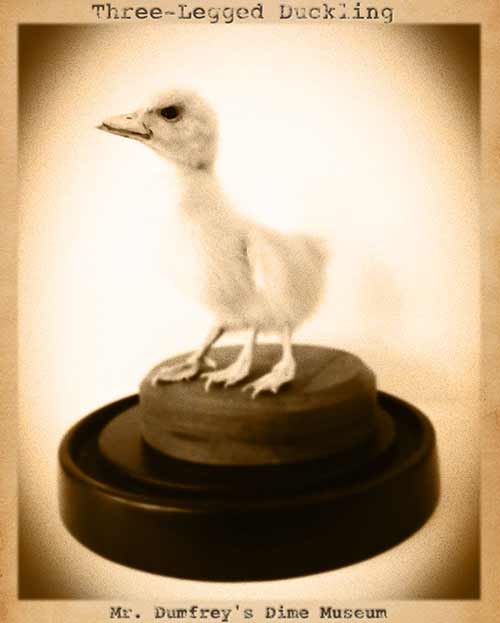
Three-legged Duckling
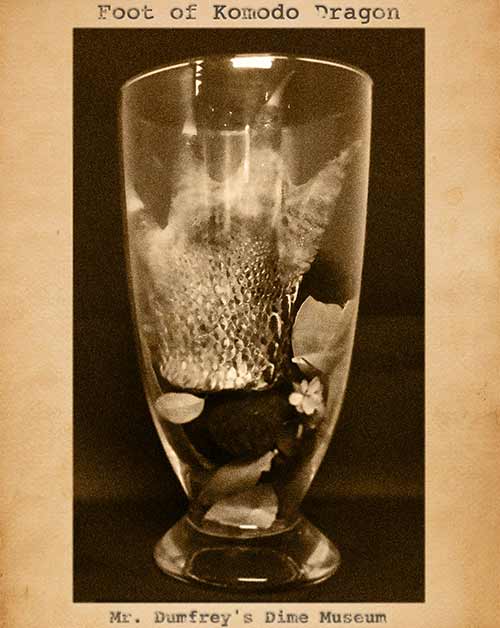
Foot of Komodo Dragon
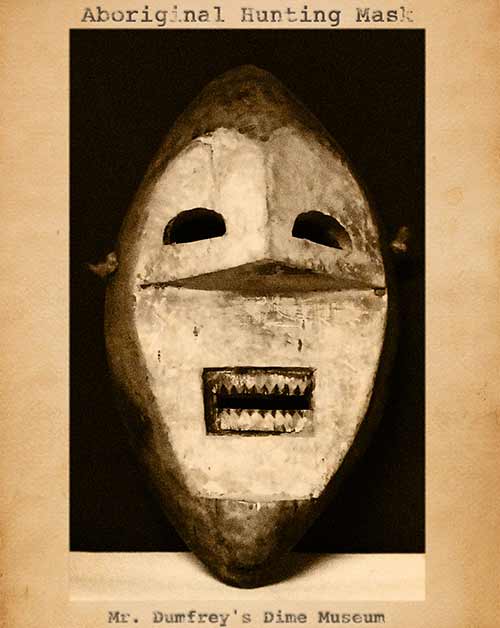
Aboriginal Hunting Mask
Of this three-legged duckling there is very little to tell except that it came to us from the farmer on whose land it had been born. This was a Richard Alberblatstz of the Plattskill Alberblatstzes, a hard-working fellow but perhaps a little slow--and not, in fact, very suited to farming. Mr. Alberblatstz was too soft-hearted, too distractible, too prone to flights of fancy and periods in which he would do nothing but lie on his back and contemplate the clouds drifting by. In particular he loved birds, especially the family of ducks that lived on the pond across the road from his property.
On one of his daily walks he heard a commotion from the water. Curious, he approached the edge of the pond, only to see the strangest thing: a tiny, three-legged duckling being attacked by its older siblings, who were attempting to drown it. As he had been born with a large birthmark in the exact shape of Florida, splotched across his right cheek, and had endured plenty of teasing from his childhood classmates about it, he ran forward to help the deformed duckling.
He rescued the little duckling and carried it home. His wife was delighted by the oddity of the thing, as were his children, who named the bird Trinity and cuddled with it in their beds at night. The bird was a reminder, Mrs. Alberblatstz liked to say, that all things were beautiful before God.
The next winter the snows came hard in October and did not stop until nearly May. In the meantime Richard Alberblatstz discovered that due to some error on his part, all the potatoes were infested with rot, and come February his children were in danger of starving. His wife handed him a rifle and instructed him to kill the ducks on the pond. Though it hurt him to do it, he didn’t hesitate. He would have done far worse for his family.
Of course they would never have dreamed of hurting Trinity, the three-legged duck, who by then was a member of the family. And so in the end the deformity that had nearly cost the duckling its life instead saved it from ending up glazed with honey and served on a roasting platter.
The venom of the Komodo Dragon is well known to be one of the most deadly substances on earth. The bite of these giant lizards will bring down prey many times larger than themselves.
When Angga, the mighty warrior, came home with puncture wounds on his arm, and a fever in his brain, no one thought he would survive the night.
A young man, Gilang, was put in charge of watching over him and making his last hours as comfortable as he could. Miraculously, Gilang was able to keep the warrior alive through the night. He cleaned his wounds, and cooled his head, but he could not get the fever to break completely. When the sun began to rise, he knew that all he had done would just buy a few days. He put his sister in charge of Angga, leaving her with detailed instructions for his care, and set out to find a cure.
For three days he walked away from the rising sun. He saw many plants and animals along the way, but none of them were right. As the sun set on the third day, he saw a glowing light in the distance, like a star fallen to earth. He just knew this was the medicine he needed. Gilang ran toward the light, and found an enormous golden beehive up in the tree. He climbed, enduring many stings from the angry bees, and scooped honey into a small jar he’d taken with him on his journey.
When he reached the bottom of the tree, Gilang began to run. He made it home in just a day and a half, and found Angga just barely alive. He spread the honey over his wounds and then fell to the floor, close to death from exhaustion.
The next day the mighty Angga began to get better, and as soon as he was strong enough he killed the Dragon that almost killed him. He displayed the body in his home, as a trophy, but the paw he gave to Gilang, as a thank you for the service Gilang had paid him.
A story about this mask:
A girl was born too soon. Her mother wasn’t expecting her, but knelt down anyway and her husband held the woman steady until the baby came. They named her Kirra because she came as quickly as fire through the brush. As she grew older they kept calling her that because she was trouble. Kirra was not interested in the plantings and diggings of the women. Lizards and small birds didn’t make for interesting prey. Instead she would sneak out with the men on the long hunts, hoping to learn how they brought down the great emu: birds as big as men with sharp beaks and strong legs. She never made it far. Sometimes the men would pretend they couldn’t see her creeping along behind them, but they always sent her back before they'd gone too far from the village.
It wasn’t fair. Boys her age were allowed to go. They got fierce tribal hunting masks designed to frighten away the ghosts, demons, and angry spirits that inhabited the surrounding wilderness. They came back with stories of giant kangaroos and enormous insects. So Kirra began to fashion a mask. Perhaps, she thought, if they see delete wood and began to carve her fearsome new face. She made it a flat face. A plain face. A face of death. She gave her new face sharp teeth that would rip any ghosts to pieces.
A boy saw her working on the mask. He liked it, and asked if he could have it when she was done. She told him no, and the boy began to cry. The men thought he was weak. He had hoped the mask would show them how fierce he really could be. Kirra felt pity for the boy, so she let him have the mask and decided to make a new one for herself. But again, a hunter asked her for the second mask, to give him courage for the hunt.
Word of Kirra’s masks spread. It was said that they were the fiercest. It was said that demons would run so far from them that an entire week-long hunt could be protected. Men began to bring her materials to use in her mask-making. Pelts from kangaroos. Feathers from the huge Emus. Finally Kirra's masks became so famous, that men would hunt each other just for the chance to possess one. And then she stopped making masks and, with this, her last and final mask, went on a long adventure. When she died of old age she was wearing the mask and it was said they found her smiling underneath.
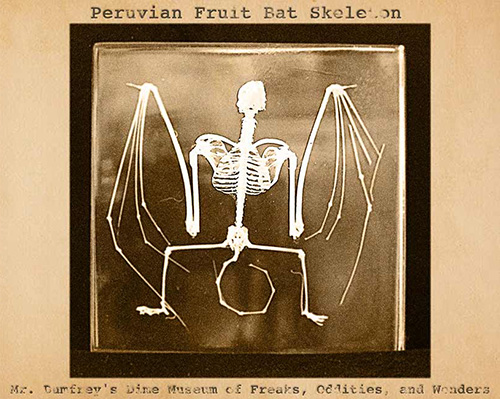
Peruvian Fruit Bat Skeleton
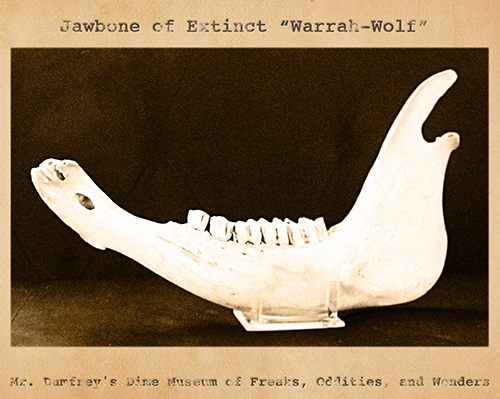
Jawbone of Warrah Wolf
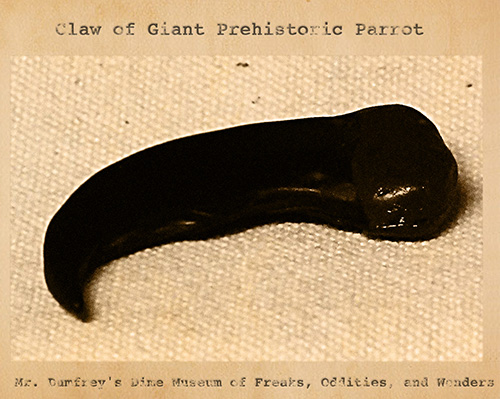
Giant Parrot Claw
What you see before you is no mere skeleton, and no mere fruit bat. In fact, it is no fruit bat at all.
It is all that remains of the most famous, and famously tragic, vampire in all of Europe: Prince Peter das Lágrimas of Portugal, also known, on this continent, as Peter of the Tears.
No one knows exactly how long Peter had been alive when he met the young Donatella Delanostre, or how he had accumulated his vast wealth. He was at least several centuries old by the time the real story begins, in 1775, and was known for his vast appetite for blood and also his extremely lavish style of entertaining, which ensured that even many of his victims remained his friends.
All the townspeople kept watch on his castle, knowing that as long as the music flowed down from the hill, as long as lights still burned in the windows, the party went on and they were safe. But as soon as the party was over, Prince Peter would descend with a ravenous hunger and prey on the people, and they were powerless to stop him.
It is likewise unknown when and how he first met the beautiful Donatella Delanostre, the lovely and modest orphaned daughter of a milliner. It was said that she was so sweet that a single word from her lips could turn a vat of blueberries to jam. And in fact she worked in a pastry shop, and her pastries were the best in the city, possibly the world, so perhaps it is true.
All that is known is that as soon as he saw Donatella, Peter began to change. He took pains to make sure that his dress was impeccable, and to remove all evidence of bloodstains from his linen shirts. He developed a seeming fascination with pastries and passed by the bakery nearly every night, where he often appeared to do nothing but stand in front of the display window and puzzle over the almond cakes for hours at a time. He stopped hosting parties and fired all the musicians except one, a cellist, who played the same love song every night, a song so full of longing that grown men, hearing it, stopped and wept in the street.
In short, he fell in love.
Somehow, he won Donatella over. The gentle orphan, who frequently stopped to rescue ladybugs from the street and passed through the city feeding stray cats with leftover pastry scraps, fell in love with the most fearsome vampire Portugal had ever seen, and at night they were often seen sitting side by side on a park bench, her blond head resting on his shoulder, his white hand caressing her cheek. And yet, gentle soul that she was, she could not bear the idea that in order to be together, she would have to become this terrible thing, the blood-feasting monster.
Vowing to prove to her that he could change, Peter foreswore the taste of blood altogether and began drinking the nectar from a variety of night-blooming flowers the fruit bats favored, thus earning his second nickname: the Fruit Bat of Portugal. Still Donatella could not bear to join his side as a vampire. But even as he withered away, she grew old and withered too, since she had sworn she would never love anybody else. After Donnatella died, Peter spent the final years of his life as a fruit bat, too weak and heartbroken to change form.
When it still walked the earth, The Warrah went by many names.
Some called it the Falkland Islands Fox, others the Antarctic Wolf. Its scientific name is Dusicyon Austrlis, which means the foolish dog of the south.
Common belief says the animal was so named because its overly friendly nature towards humans led over-hunting and eventual extinction. We at Mr. Dumfrey's, however, know the true story of a very foolish Warrah, (whose jaw-bone you can see before you) that gave his entire species such a silly reputation.
The Warrah in question was an orphan named Wally. Wally, like many fox-like creatures, loved to think of himself as a trickster. Unlike most foxes, he was so clumsy, so distractible, and overly trusting that daring him to do various foolish things became a popular game among his friends.
There was an Old Warrah on the island, whose husband had died and left her with many pups to take care of. She had the most lovely spacious den out of any Warrah, but had a fierce temper. All the young Warrah were frightened of her.
"Wally," the fool's friends said to him. "We dare you go into Old Warrah's den, and pretend to be one of her pups."
"Easy!" Wally said. "For I am small, and innocent of face." He ran over to her den, and his friends laughed themselves to sleep thinking of how the Old Warrah would snarl.
Wally went into the den and found all the pups asleep for the afternoon, the Old Warrah watching over them with her eye half cracked open. Wally tip-pawed into her den, giggling to himself as he lay down amongst her pups.
Strange boy, the Old Warrah thought. When she woke up at night to find him still there she thought again, strange boy. When he woke up with the rest of her pups and called her mama she found him even stranger.
"Okay son," she said. "All my pups have to work for the family. Why don't you go find us some dinner?"
"Yes mama!" he said, grinning broadly at what a good trick he was playing. He spent the day killing birds, enough to feed not only himself but his new family as well. The whole time he laughed, thinking that he was the best prankster of all time. For months, Wally's friends waited for him to be violently kicked out of the Old Warrah's den, but he was such a good hunter, that she decided adopt the strange boy as one of her pups and let him stay.
The story of his foolishness spread, and everyone laughed and smiled at Wally as he ran by, but none laughed or smiled as much as he did, thinking he was the best joker to have ever lived.
Once upon a time there was a beautiful jungle island, for many years now submerged in the depths of the ocean, which was inhabited only by huge, gigantic Parrots. It was a green place, full of sweet nectar, and all the seeds a bird could want.
It was also completely wordless. The Parrots of Parrot Island could speak, indeed, they could recite whole Shakespearean soliloquies if given the chance, but they could not come up with any words of their own. They could only repeat words they'd already heard, and since they were the only creatures on the island, they had no words to use.
The Parrots got along fine, of course. They communicated with wild wiggles and complicated wing dances. The only one who struggled was a Lady Parrot named Nalani, who was born with a twisted foot, and a broken wing. She tried to shake and shimmy like the rest of the birds, but her meaning was often mistaken. Still, everyone loved her, because she had the sweetest voice, and her wordless songs brightened everyone's waking hours.
Nalani had a secret, which is that she was in love. Thoughts of the barrel-chested Gentleman Parrot Chakrii had filled her heart and soul since she'd first seen him dance. She'd tried to tell him of her feelings many times, but he always misunderstood them for gestures of friendship. Every time he danced the friend dance for her, it broke her heart, and made her love him even more.
One evening Chakrii took Nalani down to the beach, to try the seeds from a purple berry she especially liked. He walked when she couldn't fly anymore, and helped her over the largest fallen branches. They snacked on the berries, and Nalani searched her brain for some way to show him how she felt.
Just then, from some passing ship, a clear voice came from over the water. It sang:
I love you, I love you, I love you, My love.
In the magical way of Parrots, Nalani instantly recognized the meaning of the words. Finally having what she was always needing, she turned to Chakrii and repeated them to him in her most beautiful singing voice.
I love you, I love you, I love you, My love.
It didn't take three seconds before he sang them back to her. For the rest of their lives, although those were the only words they could speak to each other, they knew they were the only ones that they needed.
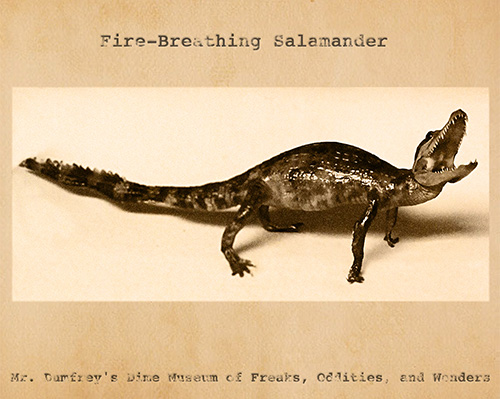
Fire-Breathing Salamander
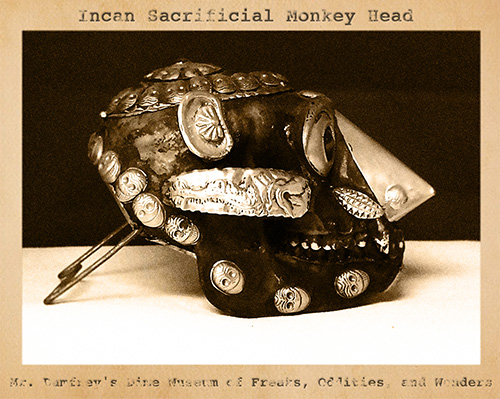
Incan Sacrificial Monkey Head
In the year 1891, a hiker in a remote area of Alaska found some gold nuggets in a mountain stream.
When news of this discovery spread, thousands of treasure-hunters headed north in hopes of getting rich. One of these was a young man from Manhattan named Jake Landon. Jake had spent his whole life in the city and, except for occasional walks through Central Park, and had no experience of the outdoors. Nevertheless, he believed that, as long as he equipped himself with the proper supplies, he would have no trouble surviving in the frozen wilderness.
Investing all his money in warm clothing, canned food, and matches, he headed to Alaska and, after a difficult journey by boat, train, and dog sled, found himself alone in an icy mountainous region of Alaska. Unfortunately, he quickly realized that there were two very useful items he had neglected to bring along: a map and a compass. It wasn't long before he was completely lost in the snow.
One night, after hiking in circles for hours and hours, he decided to make camp beneath a great pine tree. First, he opened his only remaining can of pork and beans and placed it on the ground. Then he gathered a bunch of fallen twigs and pine needles, arranged them into a little pile, and took out his last box of matches. Sliding it open, he saw that there were only three matches left inside. He pulled one out, scraped it along the side of the box, and it burst into flame. When he reached down to light the little mound of kindling, however, his frozen hands trembled do badly that the flame went out! He tried again with the second match. This time, his fingers were so numb that he dropped the lit match and it died in the snow. That left just one match. If he couldn't get the fire started, he knew he would freeze to death.
Putting one end of the match between his teeth, he held the matchbox up to his mouth and, with a quick swipe of his head, lit the match. Then he bent over and held the flame to the little mound of twigs and needles. His heart leapt when he saw the kindling start to smoke, then glow, then burst into flame. He was saved!
Unfortunately he didn't realize that he was sitting directly beneath a big tree branch that was covered with snow. As his fire grew stronger, the snow began to melt from the heat. All of a sudden--whomp!--a big load of half-melted snow fell onto the fire and extinguished it! Now Jake knew he was doomed.
But even as he curled up and waited for death to find him, he saw something strange: a little lizard crawling out of a hole in the bottom of the tree trunk. Even stranger, smoke seemed to be coming out its nostrils. Was he dreaming? Then he remembered stories he had heard about a rare fire-breathing salamander that lived in the Alaskan wilderness and was worshipped by a local tribe of Eskimos. Sure enough, as Jake watched, the lizard walked up to the open can of pork and beans, opened its mouth, and let out a blast of flame. In two seconds, the food was bubbling hot.
I love you, I love you, I love you, My love.
In the magical way of Parrots, Nalani instantly recognized the meaning of the words. Finally having what she was always needing, she turned to Chakrii and repeated them to him in her most beautiful singing voice.
Well, to make a long story short, Jake gobbled up the food, grabbed the little creature, and eventually made it back to New York, where he put the miraculous salamander on display and became a rich man after all.
In the year 1856, a young Mexican boy named Diego Montero, who had just had his tenth birthday, was wandering around the outdoor market in his hometown when he spotted a strange object on the table of an wrinkled old woman.
It was the skull of what appeared to be a tiny man, decorated with all kinds of silver ornaments. When Diego asked about it, the old woman explained that it was actually the skull of a sacred golden monkey from the long-vanished Inca empire. It seems that, many hundreds of years ago, the Inca sent out all the young men in the land and tasked them to capture a golden monkey. The young man who brought back the largest monkey was rewarded with what the Inca considered a tremendous honor. He was taken to the temple and sacrificed to their main god, Tzotchkecola.
Eventually, the leader of the Inca, King Qztklitlnicl, noticed that he was having trouble finding soldiers for his army because so many young men were being sacrificed. What to do? After giving the matter much thought, he had a brainstorm. Instead of sacrificing the young men who captured the biggest monkeys, why not sacrifice the monkeys? This idea met with great approval among the young male population of the Inca empire. The monkeys weren't so thrilled, but there was nothing they could do about it.
The old woman finished her story by telling Diego that the beautifully decorated skull on her table was the head of one of these ancient Incan sacrificial monkeys. It had been in her family for many generations, but she badly needed money and had decided to sell it. After Diego bought it, she mentioned one last thing: the monkey head would grant its owner three wishes. As Diego hurried away with his new prize, the old woman called something after him but, in the noise of the marketplace, he couldn't hear what she said.
Now it so happened that Diego, who was very small for his age, was the favorite target of a bully named Jorge Rivera. This had become such a big problem that Diego dreaded going to school. As he sat at dinner that night, looking very glum, his mother asked what was wrong. "I wish I didn't have to go school tomorrow." To his surprise, his mother let out a laugh. "Silly boy," she said. "Did you forget? Tomorrow is the holiday of Cinco de Mayo. School is closed!"
Back in his room, Diego gazed at the monkey head and wondered if what the old woman had said could possibly be true. Could the head really grant three wishes? He decided to test it. Closing his eyes, he said aloud: "I wish I were stronger than Jorge Rivera."
When he awoke the next morning, he leapt out of bed and ran to the mirror, hoping that his wish had been granted and that his body had become big and muscular overnight. Much to his disappointment, the Diego that looked back at him was the same skinny little boy as before. Disappointed, he went into the kitchen for breakfast. To his surprise, he found his mother looking very sad. When he asked what was the matter, she told him that she just heard from a neighbor that one of his schoolmates, a boy named Jorge Rivera, had been kicked in the head by a mule and was now in the hospital, unable to move a muscle.
Diego was so shocked he could barely eat his breakfast burrito. He felt awful. Had his wish caused this accident? True, he didn’t like Jorge Rivera. But he certainly didn't want him so terribly injured that he couldn't move. The moment he was done with his meal, he got the monkey head from his room and ran to the marketplace. Finding the old lady, he told her what had happened.
"Didn't I warn you?" she said after heating his story.
"What do you mean?"
"As you were running off, I called out to you."
"I couldn't hear you," said Diego. "What were you calling?"
"An old proverb. 'Be careful what you wish for. You may get it.’"
Diego thought about this for a while. Then he said. "Well, I still have one more wish. And this time, I want it to come true."
"Go ahead," smiled the old woman.
He closed his eyes and spoke his wish.
One week later, Diego came home from school. His clothes were all torn and he had a black eye and a bloody nose, as if some school bully had just beaten him up. His mother was terribly upset but Diego was smiling. Everything was back to normal.

Characters from the museum
